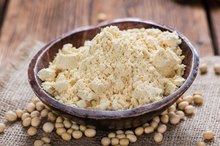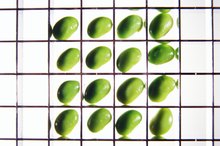What does fact checked mean?
At Healthfully, we strive to deliver objective content that is accurate and up-to-date. Our team periodically reviews articles in order to ensure content quality. The sources cited below consist of evidence from peer-reviewed journals, prominent medical organizations, academic associations, and government data.
The information contained on this site is for informational purposes only, and should not be used as a substitute for the advice of a professional health care provider. Please check with the appropriate physician regarding health questions and concerns. Although we strive to deliver accurate and up-to-date information, no guarantee to that effect is made.
Benefits of Soy Protein for Breast Growth
No clinical trials have investigated the efficacy of soy -- or any other botanical product -- to increase breast size, according to Mayo Clinic physician Sandhya Pruthi 1. Nevertheless, soy-based foods and supplements may help to increase breast growth in women with fewer side effects and lower costs than cosmetic surgery or prescription drugs. Medline Plus, a service of the U.S. National Institutes of Health, notes soy's possible use as a breast enhancer. However, until scientists have conducted further clinical trials, the NIH regards this use as theoretical.
If you are experiencing serious medical symptoms, seek emergency treatment immediately.
Hormonal Effects
According to the NIH, soy protein contains natural compounds that are chemically similar to estrogen. These "phytoestrogens" include medicinal isoflavones like genistein, which have an estrogen-like effect on the human body. Because estrogen plays a role in the development of breast tissue, soy may provide the hormonal boost necessary for improving the size and shape of breasts.
Affordability
Ways to Naturally Stimulate Breast Growth
Learn More
A diet rich in soy can be surprisingly affordable. Minimally processed soy foods like tempeh, tofu and soy milk contain large quantities of isoflavones but cost little more than their meat- or dairy-based counterparts. High-soy diets may be a viable alternative to cosmetic surgery.
Non-Prescription
Unlike hormone-affecting drugs and cosmetic surgery, a diet rich in soy protein does not require a prescription. However, caution is advised for certain individuals. While the NIH considers dietary soy to be safe for those taking anticoagulant drugs like warfarin, soy isoflavone supplements may theoretically increase the risk of an adverse reaction. Isoflavones in soy can also alter the way the liver metabolizes certain drugs, according to the NIH. People with medical conditions should consult a qualified physician or dietitian before pursuing a high-soy diet.
- Unlike hormone-affecting drugs and cosmetic surgery, a diet rich in soy protein does not require a prescription.
- While the NIH considers dietary soy to be safe for those taking anticoagulant drugs like warfarin, soy isoflavone supplements may theoretically increase the risk of an adverse reaction.
Painless Growth
The Benefits and Drawbacks of Soy Protein Powder in Women
Learn More
Unlike pharmaceutical and surgical breast enhancement protocols, soy protein does not cause breast tenderness. In fact, NIH reports that soy may prevent cyclical breast pain associated with menstruation.
Related Articles
References
- Mayo Clinic: Natural Breast Enhancements
- Dewi FN, Wood CE, Willson CJ, et al. Effects of Pubertal Exposure to Dietary Soy on Estrogen Receptor Activity in the Breast of Cynomolgus Macaques. Cancer Prev Res (Phila). 2016;9(5):385-95. DOI: 10.1158/1940-6207.CAPR-15-0165
- Braakhuis, A., Campion, P., and K. Bishop. Reducing Breast Cancer Recurrence: The Role of Dietary Polyphenolics. Nutrients. 8(9):pii:E547. DOI:10.3390/nu8090547
- Iwasaki, M., Inoue, M., Otani, T. et al. Plasma Isoflavone Level and Subsequent Risk of Breast Cancer among Japanese Women: A Nested Case-Control Study from the Japan Public Health Center-Based Prosepctive Study Group. Journal of Clinical Oncology. 2008. 26(10):1677-83. DOI:10.1200/JCO.2007.13.9964
- Messina, M. Soy and Health Update: Evaluation of the Clinical and Epidemiologic Literature. Nutrients. 2016. 8(12):pii.E754. DOI:10.3390/nu8120754
- Uifalean, A., Schneider, S., Ionescu, C., Lalk, M., and C. Iuga. Soy Isoflavones and Breast Cancer Cell Lines: Molecular Mechanisms and Future Perspectives. Molecules. 21(1):E13.DOI: 10.3390/molecules21010013
- Ziaei S, Halaby R. Dietary Isoflavones and Breast Cancer Risk. Medicines (Basel). 2017;4(2) doi: 10.3390/medicines4020018
- American Cancer Society: "Soy and Cancer Risk"
- Hilakivi-clarke L, Andrade JE, Helferich W. Is soy consumption good or bad for the breast?. J Nutr. 2010;140(12):2326S-2334S. doi: 10.3945/jn.110.124230
Writer Bio
Juniper Russo, an eclectic autodidact, has been writing professionally since 2008. Her work has appeared in several online and print-based publications, including Animal Wellness. Russo regularly publishes health-related content and advocates an evidence-based, naturopathic approach to health care.









